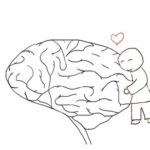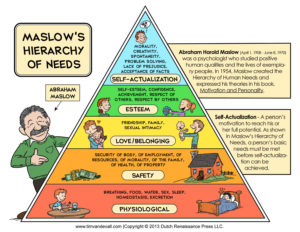How to Manage Intrusive Thoughts

Our thoughts come and go spontaneously, mostly without our direct control. When we are not mindful of our thoughts patterns we are at their mercy, allowing them to influence our mood and actions.
That´s just part of what makes us human and essential for our survival and life on this planet. One of the main issues resulting from the lack of self-awareness is not being able to distinguish our thoughts from facts and false assumptions or opinions.
This is especially problematic when our thoughts are negative and unhelpful. Thoughts have the power to make us lose touch with reality, make us feel fearful, anxious and depressed.
There are also times that even though we are aware and conscious of the unhelpful thoughts we are having, we still find difficult to not let oneself be affected by them. In those times, it may feel that the more we try to fight and suppress those thoughts, the stronger they become. So what´s the solution, you may ask?
#1 Become Your Mind Best Friend

Reframe your mindset, instead of trying to fight the fabricator of the unhelpful thoughts you have to become its best friend.
Its crucial to understand that our mind is there to protect us, and as such it’s always scanning our environment looking for threats.
You may have noticed that when you are going through a rough patch, your mind chatter becomes even more negative, that´s because negative thoughts attract more negative thoughts. Our mind is used to patterns and is a being of habits. It often goes on an automatic pilot and just follows that same pattern over and over again. ( Human Mind and Psychological suffering)
Our mind wants to protect us at all costs. Either from present threats, future threats, or looking into the past hurts to remind us of the times we got hurt, to protect us from getting hurt again.
Intrusive thoughts are a result from the mind being on an overactive/ overprotective mode. In order to become your mind best friends its important that you appreciate your mind intentions, reframe how you look and feel about intrusive thoughts. Next, we are going to look on how to change our mind overactive mode.
#2 Observe Your Thoughts
Observe your thoughts with a compassionate heart and from a neutral perspective, meaning without labeling them bad or good, without engaging with them.
When a difficult thought arises you can tell yourself,
“ –umh that´s interesting” or , “ I understand why you thinking that way, but that´s not my opinion”
#3 Commit to Positive Thinking
Reflect on things you are grateful for having in your life right now. Make a list what´s going well, what you are appreciative for. Make a conscious decision to focus on the positive aspects of your life and keep reminding your mind what your preference is.
However, I understand that when you feel overwhelmed, it may be hard to think about positive aspects of your life. In this case scenario you may need a distracting technique, such as the naming things exercise.
This exercise helps break your mind free from the automatic pilot pattern, by engaging with all your senses and bringing your attention to the present moment.
#4 Distraction Techniques
Naming Things 54321 exercise:
Become aware and name 5 things you can see ( for e.g: if outside; car, clouds, tree etc…),
- Name 4 colors you can see
- Name 3 things you can hear
- Name 2 things you can smell
- Name 1 object you can see that has a special meaning to you (if at home) or 1 thing you can see that is special to you.
There will be times when you may have to do this exercise a couple of times in order to quiet your mind and other times once will be enough.
Math calculations
You can also do math calculations in your mind. If you are not a Maths genius, this will likely require your full attention. If you do this for a while, your mind will just move on to the next thing. Especially for those who do not enjoy math, soon enough your brain will associate negative thoughts patterns to the math calculation activity. Therefore, your sub-conscious mind will automatically start avoiding unhelpful thoughts patterns. If there´s something our mind avoids like the plague is boredom.
#5 Declutter Your Mind
Ultimately, you have to clear up the mess in your mind, by resolving and processing your thoughts and emotions. If your thoughts have a recurring theme, or you have one particular unhelpful thought coming up all the time, then is likely that there´s something in there for you to face and resolve it.
Start by capturing the recurring thought from your subconscious mind to your conscious mind attention, and actually take some time to explore, process, and resolve. Find a quiet space where you can spend some time on your own and do one of the below exercises, try the Katie Byron 4 liberating questions and write your questions down:
Is it true?
Can you absolutely know that it’s true?
How do you react when you believe that thought?
Who would you be without the thought?
Or the Court exercise,

In one piece of paper write the thought you would like to take to court,
and then in one side of the paper you will have the Defense, where you will write all the evidence and reasons you have to justify that thought, and on the other side you will have the Prosecution where you will write all the evidence and reasons you have that proves that thought is not true.
At the end, you´ll look at both sides and as an impartial judge as and hopefully reach a veredict. You can then write a statement that´s closer to the reality.
You can get the Court exercise worksheet here
Allow yourself time to explore your inner world, and feel whatever needs to be felt, without judgment or labeling as bad or good.
I see our emotions and thoughts as a compass provided to us by the divine. This compass signals when we need to bring our attention to our inner world. It knows before we do that there´s something not quite right and that we need to bring our attention to.
It could be unresolved past trauma, current life situation, matters of the heart, overall wellbeing, etc.
It tells us when is time to stand back and reflect on which of our needs are not being fulfilled as well as changes one must implement in our life, in order to fulfill those needs.
Lastly, remember that our brain can either be our best friend or our worst enemy. It’s up to us to choose which.
If you have found this article helpful, please share it with your friends and family, and leave us a comment below.




I have been struggling with my mental health for a while now, your suggestions make sense, I’ll try them. Thanks!